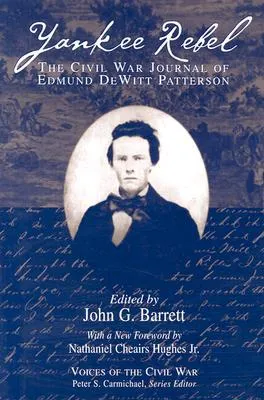Yankee Rebel: The Civil War Journal Of Edmund Dewitt Patterson
By (author): "John Gilchrist Barrett"
Publish Date:
November 19th 1966

ISBN157233245X
ISBN139781572332454
AsinYankee Rebel: The Civil War Journal Of Edmund Dewitt Patterson
Original titleYankee Rebel: The Civil War Journal of Edmund Dewitt Patterson (Voices of the Civil War)
“I do not know of any other soldier account which gives a more realistic and vivid representation of what a Civil War battle was like. . . . It is of exceptional merit and interest. Its excellence is so outstanding as to set it apart from the general run of published (and unpublished) personal narrative.”—Bell Irwin Wiley“Richard B. Harwell, who knows as much about Confederate lore as anyone, finds Patterson’s diary ‘the finest personal narrative of Confederate experiences since Henry Kyd Douglas’s I Rode with Stonewall.’ Happily, Yankee Rebel, long out of print, can now be shared with new generations of readers.”—from the Foreword by Nathaniel Cheairs Hughes Jr.Edmund DeWitt Patterson was nineteen when the Civil War began. Born in Ohio, he had left home just after his seventeenth birthday and gone south to seek his fortune, first as a book salesman, then as a schoolmaster and clerk. When the war broke out, he volunteered for the army of the Confederacy, much to the dismay of his Unionist family. The day he enlisted he began a diary that, for the sharpness of its observations and the literary force of its narration, makes it a splendid firsthand account of the Civil War. Patterson, who later had a distinguished career as a lawyer and judge in Tennessee, was more than a soldier. He was a scholar, reporter, humorist, and everyday philosopher of surprisingly mature views—for he was not old enough to vote until the war was half over.Patterson’s journal, originally published in 1966, moves through his participation in the major battles of Williamsburg, Seven Pines, Seven Days, Fredericksburg, his capture at Gettysburg, and his months in a Federal prison within a few miles of his Northern family. The accounts of combat are vivid and moving, not only telling in detail what happened in battle but also giving a clear and realistic account of the author’s reactions to combat. Engaging and valuable information on morale, religion, diversions, food, shelter, clothing, attitudes toward Federals, and relations with comrades—all enlivened with Patterson’s delightful sense of humor—make this a journal of outstanding quality. The latter portion of the diary provides a fresh and absorbing account of his prison life on Johnson’s Island in Lake Erie and his exchange and return to Richmond in the final days of the war.“I do not know of any other soldier account which gives a more realistic and vivid representation of what a Civil War battle was like. . . . It is of exceptional merit and interest. Its excellence is so outstanding as to set it apart from the general run of published (and unpublished) personal narrative.”—Bell Irwin Wiley“Richard B. Harwell, who knows as much about Confederate lore as anyone, finds Patterson’s diary ‘the finest personal narrative of Confederate experiences since Henry Kyd Douglas’s I Rode with Stonewall.’ Happily, Yankee Rebel, long out of print, can now be shared with new generations of readers.”—from the Foreword by Nathaniel Cheairs Hughes Jr.Edmund DeWitt Patterson was nineteen when the Civil War began. Born in Ohio, he had left home just after his seventeenth birthday and gone south to seek his fortune, first as a book salesman, then as a schoolmaster and clerk. When the war broke out, he volunteered for the army of the Confederacy, much to the dismay of his Unionist family. The day he enlisted he began a diary that, for the sharpness of its observations and the literary force of its narration, makes it a splendid firsthand account of the Civil War. Patterson, who later had a distinguished career as a lawyer and judge in Tennessee, was more than a soldier. He was a scholar, reporter, humorist, and everyday philosopher of surprisingly mature views—for he was not old enough to vote until the war was half over.Patterson’s journal, originally published in 1966, moves through his participation in the major battles of Williamsburg, Seven Pines, Seven Days, Fredericksburg, his capture at Gettysburg, and his months in a Federal prison within a few miles of his Northern family. The accounts of combat are vivid and moving, not only telling in detail what happened in battle but also giving a clear and realistic account of the author’s reactions to combat. Engaging and valuable information on morale, religion, diversions, food, shelter, clothing, attitudes toward Federals, and relations with comrades—all enlivened with Patterson’s delightful sense of humor—make this a journal of outstanding quality. The latter portion of the diary provides a fresh and absorbing account of his prison life on Johnson’s Island in Lake Erie and his exchange and return to Richmond in the final days of the war.John G. Barrett is professor emeritus of history at Virginia Military Institute. He is author of The Civil War in North Carolina and Sherman’s March Through the Carolinas and coeditor of North Carolina Civil War Documentary and Letters of a New Market Cadet.